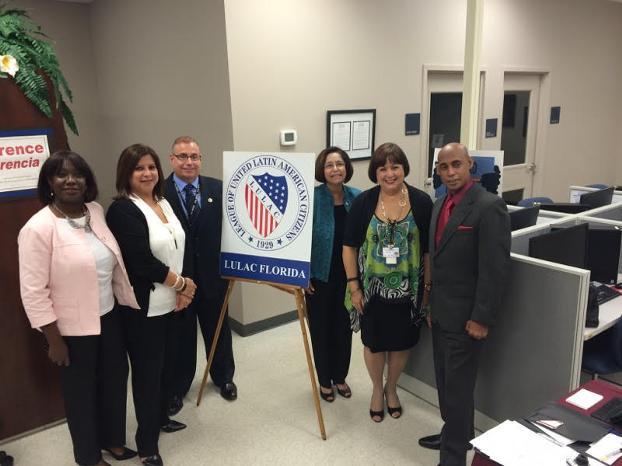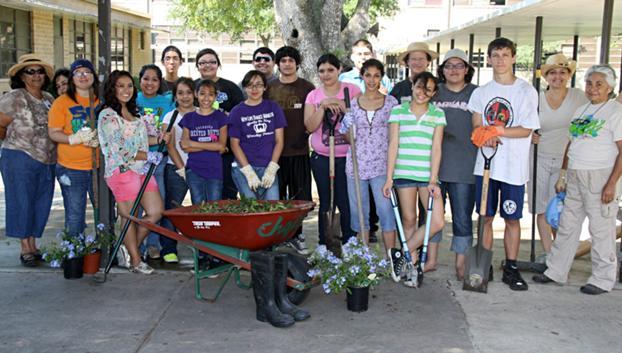The Case for Puerto Rico Statehood
Posted on 11/10/2015 @ 06:45 PM

By: Roger C. Rocha Jr., LULAC National President
Earlier this week, presidential candidate Ben Carson joined Jeb Bush and Marco Rubio in voicing support for granting statehood to Puerto Rico. Such support is welcome news to the people of Puerto Rico, who presently are experiencing economic hardship and would benefit greatly from statehood status.
Whatever the candidates’ motivation, the $72 billion debt crisis is an important issue facing Puerto Rico today. Puerto Rico has been in a recession since 2006, with unemployment at 14 percent and the majority of Puerto Ricans living in poverty. Many have moved to the mainland seeking employment opportunities and access to programs and resources that are not available in the territory.
If Puerto Rico obtained statehood status, the territory’s public corporations and municipalities would be allowed to file for bankruptcy. Such a move would enable Puerto Rico to restructure its debt in an organized manner. It would also provide more financial options and benefits that ultimately will help the Puerto Rican people. These benefits include the full benefits of the Affordable Care Act, the full extension of the Earned Income Tax Credit, and full reimbursement parity under Medicare and Medicaid.
Since 1917, Puerto Ricans have been recognized as U.S. citizens. In addition, since World War I over 200,000 Puerto Rican men and women have served in the Armed Forces, with nine having received the Congressional Medal of Honor. Puerto Rico has been a territory for 117 years, making the Caribbean island the longest held territory in U.S. history.
A considerable portion of the LULAC membership are U.S. citizens living in Puerto Rico who are hard-working loyal Americans. Permitting Puerto Rico statehood status is the best strategy for stabilizing Puerto Rico’s economy. LULAC will continue to keep a focus on the needs of the people of Puerto Rico and work towards a solution to the Puerto Rican debt crisis that benefits the people of Puerto Rico.
Diversidad, Dignidad y Trabajo: Ensuring Protections for the LGBT Community in the Workplace
Posted on 11/03/2015 @ 06:45 PM

Dr. Lydia Medrano, third from right, spoke on the legal protections needed in the workplace to protect the LGBT community.
By: Dr. Lydia Medrano, LULAC National Vice President for the Southeast
In September, I served as a panelist for a forum called Diversidad, Dignidad y Trabajo that took place in Tampa, Florida. I was one of four panelists who discussed the topic of the right to work with dignity, which refers to the right of every individual to obtain employment without the fear of discrimination. The forum was a collaboration between Florida LULAC, ACLU Central Florida Region and Ana G. Mendez Tampa University. The other panelists included EEOC representative Nelson Borges, human resources representative Carmen Alverio and psychologist/university faculty member Rafael Fuentes.
I told the audience of students and the general public that the right to work is not a class, gender or nationality “privilege”, but a right afforded to all citizens. Everyone has a right to work in order to support themselves and their families. People should be valued for their job performance skills as well as the quality of their work. Nobody should feel unfairly targeted or singled out for their sexual orientation or gender identity.
Full equality for LGBTQ individuals is one of the major civil rights challenges of our time. Although LGBTQ individuals have always been part of our society; now,they are much more visible and engaged in ensuring their civil rights are protected.
The LGBT community recently achieved a major civil rights victory with the legalization of same-sex marriage. Despite this victory, we must not remain blind to other types of discrimination that the LGBT community faces on a daily basis. Discrimination based on sexual orientation is discrimination, and an individual's identity should be protected by law in all fifty states. The laws must clearly define discrimination in order to be enforceable and prevent hate crimes and discrimination in the workplace.
Additionally, we must continue to work to address the issue of bullying, homelessness, and an end to the detention of Latinos. All of these are issues that affect both straight and gay Latinos and it is in these intersections where we must build coalitions to achieve change and progress.
Prejudice is a human phenomenon caused by suspicion and distrust of people that do not meet our personal, nor our societal expectations. We must educate the public on the diversity of our society and the positive contributions it brings to our culture. Concurrently, we must also show the negative impact of discrimination on the social fabric of our nation. Everyone deserves respect, and everyone should be able to work with dignity and have the opportunity to contribute to our communities without being penalized for who they are.
Driving Educational Attainment Forward Through Community Initiatives
Posted on 11/02/2015 @ 06:45 PM

Ford Driving Dreams Participants; LULAC Council #4692; Victoria, Texas
By: Elisa Aquino, Education and Youth Programs Intern, LULAC National
In California, for every 100 Latino students who enter a ninth-grade classroom, only 61 leave high school with a diploma in hand. This is an alarming statistic that demonstrates that Latinos are falling behind in California, and the stats don’t look much better throughout the nation. As the Latino population becomes the largest minority group in the country, this issue must be addressed not only in our communities, but at all levels of government. High school completion and a good education is beneficial to both the individual and the American economy. A lack of a high school diploma can jeopardize long-term economic security, employment security, and earning potential. Closing the attainment gap also benefits our economy, allowing it to grow by $2.3 trillion by 2050. Thus, it is important to develop programs that target high school completion/graduation in the Latino community.
LULAC advocates for educational equity for Latino students and has created a variety of programs to help alleviate these disparities while simultaneously advocating for legislative solutions. Because of this, LULAC and Ford Motor Company Fund are partnering to address high school dropout rates through the Ford Driving Dreams (FDD) Grants program. This program allows LULAC Councils to develop their own curriculum that will address the specific needs in their community, with the overall goal of stimulating academic achievement, increasing high school completion rates and college enrollment. Each award recipient receives $20,000 over the course of two years for them to carry out their program.
Every participating council implements each program differently. Activities range from visiting colleges and meeting with students and professors, to supporting students through the college application process, to providing tutoring sessions, and even providing STEM career opportunity workshops, all free of cost to participating students. The participants often include students who are first generation college-bound, low-income (whose parents make $50,000 and below), Latino, Spanish-speaking/bilingual students, or a combination of these demographic groups. This program addresses the needs of students who otherwise would be neglected and ignored by a public school system that often leaves behind low-income students of color. By providing them with the skills and tools necessary for their educational success, LULAC helps empower these students to fight for their future.
To look at just how the Ford Driving Dreams Grants program has significantly improved the lives of its participants, look at the data. For example, in Austin, Texas participants aimed to attain a 3.33 GPA, and by spring of 2014 the group had earned an average GPA of 3.48. In addition, 58.33% of the students at this location thanked the FDD program for inspiring them to be the first in their families to go to college. In this same report, in El Paso, Texas, in one year, students improved their GPA from a 2.69 to a 3.31, Of these students, 89% of them plan to attend college, in contrast to the 57.9% that thought it was very important to go to college at the beginning of the program.
FDD has become one of LULAC’s flagship educational programs, and its effectiveness and success have received national recognition. In September 2015, FDD was selected by the White House Initiative on Educational Excellence for Hispanics as a “Bright Spots in Hispanic Education” for their outstanding commitment to closing the high school completion gap in the Latino community.
Growing up as a first generation college Latina student, in my family, higher education was always emphasized particularly because both of my parents were immigrants with very little education. Both my parents migrated from a small pueblo in Oaxaca, Mexico. Their native language being Zapotec, they didn’t learn Spanish until they went to school at around the age of 5. Due to the poverty in their pueblo, both of my parents were forced to work in the fields and were not able to finish elementary school. My parents always share with me that if they would have been given the resources to continue their education, they would have taken the opportunity to do so. Seeing their struggles in the U.S., I have come to value the importance of completing high school and continuing to pursue higher education opportunities. I appreciate that organizations like LULAC are proactively addressing the issue of Latino high school dropout rates through empowering Latinos to graduate high school and pursue higher education. By helping students with similar background stories like myself, LULAC and Ford Motor Company Fund's partnership is one that is changing communities, not only at the local level, but nationally as well.
Elisa Aquino is an Education and Youth Leadership Programs Intern at the LULAC National Office in Washington D.C. Elisa is a fourth year student at the University of California, Santa Cruz majoring in Sociology and Latin American Latino Studies and will be graduating this upcoming spring of 2016.
Why Are States Changing Their Approach to Mathematics?
Posted on 10/23/2015 @ 07:45 PM
By: William Renderos, Policy and Legislation Fellow, LULAC National
The Common Core State Standards (CCSS) are revolutionizing our approach to children’s learning in 42 states; Washington, D.C.; and four United States territories. These standards create a clear and concise single set of education standards for all participating states, with the goal of preparing students for entry-level credit courses in two or four-year college programs or the workforce. Switching to new standards in these states gives local schools an opportunity to improve their English Language Arts (ELA) and mathematics curriculum.
Why is the common core necessary? In 2013, the National Assessment for Educational Progress (NAEP) issued their latest 8th grade mathematics report. Results showed that 79% of Latino students in the 8th grade had only a basic understanding of 8th grade math or below. Only 18% of Latino students in the 8th grade met the grade level standards for mathematics. These numbers show we need to somehow reevaluate the way we teach math to our Latino students. The new common core math standards that states have adopted allow us to do just that, opening the door to new approaches that improve the way students learn math. These new standards focus on critical thinking and reasoning development, which are key skills needed to understanding higher levels of mathematics.
Before the new standards, schools across the country would teach several concepts over a short period of time instead of focusing on in-depth knowledge of specific concepts. Like the saying goes, schools went an inch deep for every mile of concepts. Now, states with the new standards teach students in a way that helps them proficiently understand math concepts. Thus, we can say schools go a mile deep in understanding for every inch of concepts they teach. Curriculums based on the new standards build the depth of knowledge necessary to understand mathematical concepts, cultivating students’ critical thinking and reasoning skills and ensuring long-term success.
Dr. Raj Shah, creator and founder of Math Plus Academy in Ohio, talks about the importance of changing the way we think about the new math standards. In his video, Why is Math Different Now, Dr. Shah talks about how teaching students to remember math procedures at the expense of critical thinking does not work. Only a few students do well this way. However, teaching students to think and understand the concepts through critical thinking and reasoning skills helps them discover different ways of solving math problems. This leads to a better understanding of concepts for students who have trouble remembering math procedures. Ultimately, students who understand the concepts can think in many ways and it helps them with mental math.
LULAC understands that changing the way our Latino students learn math can be confusing and can create questions for parents who want to help their children succeed. To help eliminate the confusion, LULAC wants to provide parents with resources that will help improve their children’s critical thinking and reasoning skills in math. Our Ready, Set, Go Initiative will offer workshops that allow parents and their children to talk about the changes happening in the classroom while providing them with information sheets, study guides and other learning tools to help them with the new math standards.
Some of the resources will come from the website Be a Learning Hero, which separates resources by state, grade and subject, allowing parents and students to find the information they need for their state and grade on their learning tools page. Another helpful website is Univisión Contigo: Clave al Éxito, which provides Spanish resources for families who need learning tools for their child’s grade level.
Together we can change the way we think about math and help our Latino student’s intellectual growth with critical thinking and reasoning skills.
William Renderos is a Policy and Legislation Fellow for LULAC National. Prior to LULAC, he served as the Social Work Intern at Alliance for Justice and worked with a Maryland nonprofit organization to conduct outreach work with students attending alternative schools in Montgomery County. He received a Bachelor of Arts in Social Work and Sociology from the University of Maryland, Baltimore County, and a Masters of Social Work in Community Action and Social Policy from the University of Maryland, School of Social Work.

Comments
Leave a Comment
You must be logged in to leave a comment.